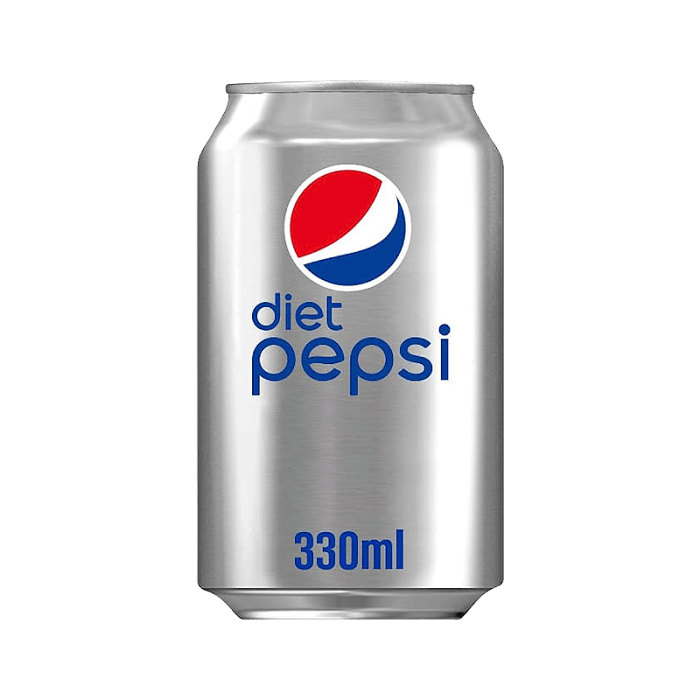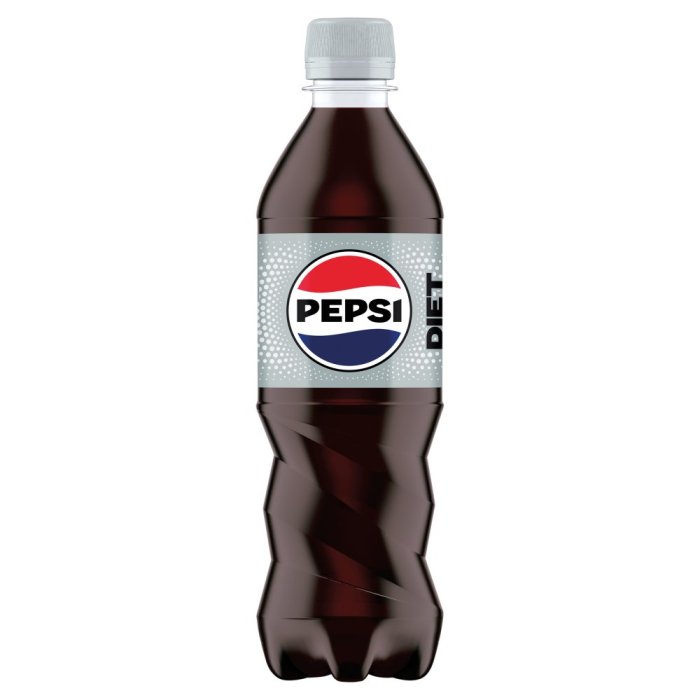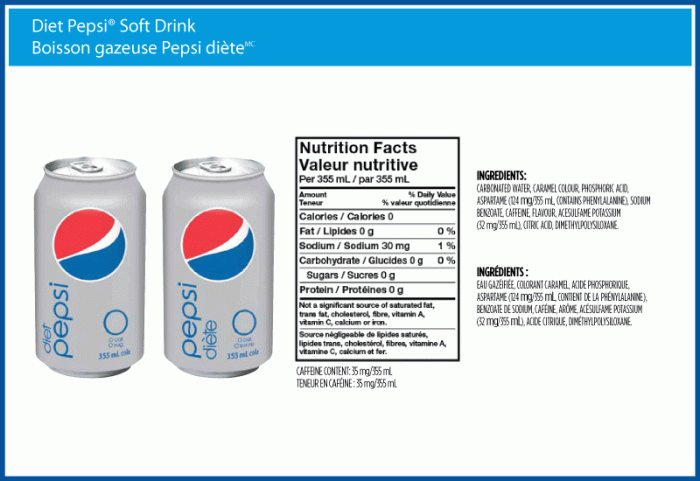Diet Pepsi Ingredients and Nutritional Profile

Nutrition facts on diet pepsi – Diet Pepsi, a ubiquitous sugar-free cola, presents a complex nutritional picture often misunderstood by consumers. Understanding its ingredients and comparing it to its sugar-laden counterpart reveals crucial differences in both immediate and potential long-term health impacts. This analysis will delve into the specifics of Diet Pepsi’s composition and its nutritional implications.
Diet Pepsi Components and Nutritional Value
Diet Pepsi’s core components are carbonated water, caramel color, phosphoric acid, and artificial sweeteners. Carbonated water provides the fizz and volume. Caramel color contributes to the characteristic dark brown hue, though its production methods and potential health implications remain a subject of ongoing debate. Phosphoric acid imparts tartness and acts as a preservative. However, the most significant components from a nutritional perspective are the artificial sweeteners, as they replace the substantial sugar content found in regular cola.
The absence of sugar significantly reduces the caloric content and carbohydrate count, but the long-term health effects of artificial sweeteners are still under investigation. The overall nutritional value of Diet Pepsi is therefore primarily defined by the absence of significant calories and sugars, while simultaneously introducing artificial sweeteners with their own set of considerations.
Nutritional Comparison: Diet Pepsi vs. Regular Cola
The following table highlights the key nutritional differences between a typical serving of Diet Pepsi and a comparable serving of regular cola. Note that specific values may vary slightly depending on the manufacturer and serving size.
| Ingredient | Quantity per serving (12 oz) | Unit | Caloric Contribution |
|---|---|---|---|
| Sugar | ~10-15 g (Regular Cola) / 0 g (Diet Pepsi) | grams | ~40-60 kcal (Regular Cola) / 0 kcal (Diet Pepsi) |
| Artificial Sweeteners (Aspartame, Acesulfame Potassium, Sucralose – may vary by region/formula) | Variable, typically small amounts | mg | ~0 kcal |
| Phosphoric Acid | Variable | mg | ~0 kcal |
| Caramel Color | Variable | mg | ~0 kcal |
| Carbonated Water | Remainder | oz | 0 kcal |
Artificial Sweeteners in Diet Pepsi and Potential Health Effects
Diet Pepsi commonly utilizes a blend of artificial sweeteners such as aspartame, acesulfame potassium, and sucralose. These provide sweetness without the calories of sugar. However, research on the long-term health effects of these sweeteners remains ongoing and inconclusive. Some studies have suggested potential links between artificial sweetener consumption and various health issues, while others have found no significant adverse effects.
It is crucial to note that the amounts used in Diet Pepsi are generally considered safe within established guidelines, but individual sensitivities and potential long-term effects warrant further investigation and cautious consumption.
Nutritional Information Across Different Diet Pepsi Sizes
The nutritional information on Diet Pepsi varies proportionally with serving size. A 20 oz bottle will contain approximately double the amount of each ingredient (except calories, which remain at 0) compared to a 12 oz can. Larger sizes simply increase the volume of the same basic components; the concentration of each ingredient remains consistent. This means that while the total amount of artificial sweeteners will be higher in a larger serving, the concentration per unit volume remains the same.
This consistency is important for consumers to understand when considering their overall intake of these artificial sweeteners.
Artificial Sweeteners in Diet Pepsi

The ubiquitous presence of artificial sweeteners in diet sodas like Diet Pepsi raises important questions about their long-term health effects. While offering a calorie-free alternative to sugar-sweetened beverages, these sweeteners have been the subject of ongoing scientific debate, with studies yielding mixed results. Understanding their metabolic impact and potential consequences is crucial for informed consumer choices.
Artificial sweeteners, designed to mimic the sweetness of sugar without the calories, achieve this through complex interactions with our taste receptors and metabolic processes. However, their impact extends beyond simply satisfying our sweet tooth; they can influence gut microbiota, hormonal responses, and even our perception of sweetness over time. This section delves into the specific effects of aspartame and sucralose, two common artificial sweeteners found in Diet Pepsi, and explores their broader implications for health.
Aspartame and Sucralose: A Comparative Metabolic Analysis
Aspartame and sucralose, while both artificial sweeteners, differ significantly in their chemical structures and metabolic pathways. Their distinct characteristics lead to varying effects on the body, impacting metabolism and potentially long-term health.
- Aspartame: Aspartame is metabolized in the body into aspartic acid, phenylalanine, and methanol. While generally considered safe in moderate amounts, concerns exist regarding its potential link to headaches, mood changes, and, in individuals with phenylketonuria (PKU), neurological issues due to the phenylalanine component. Some studies have suggested potential links to increased risk of certain cancers, though these findings remain controversial and require further research.
- Sucralose: Sucralose, unlike aspartame, is not metabolized significantly by the body and is largely excreted unchanged. This characteristic has led to its widespread use, as it avoids many of the metabolic concerns associated with aspartame. However, research on its long-term effects is still ongoing, and some studies have explored potential impacts on gut microbiota and glucose metabolism, though definitive conclusions are lacking.
Artificial Sweeteners and the Body’s Response to Sugar
Artificial sweeteners disrupt the body’s natural response to sugar in several ways. Their impact extends beyond simple calorie reduction, influencing both immediate and long-term metabolic processes.
The brain relies on glucose for energy. When we consume sugary drinks, our bodies release insulin to regulate blood sugar levels. However, artificial sweeteners, while sweet, don’t trigger the same insulin response. This discrepancy can lead to a disconnect between the brain’s expectation of a sugar rush and the absence of a corresponding metabolic response. This can contribute to cravings for sweeter foods and drinks, potentially leading to increased consumption of sugary items and weight gain.
Furthermore, some studies suggest that artificial sweeteners may alter gut microbiota composition, potentially influencing glucose metabolism and insulin sensitivity in the long run. The exact mechanisms are still under investigation, but the disruption of the normal sugar-insulin feedback loop is a key area of concern.
Sweetness and Caloric Content of Artificial Sweeteners
The following table compares the sweetness and caloric content of several artificial sweeteners commonly used in diet sodas, providing a quantitative perspective on their relative potency and caloric contribution.
| Artificial Sweetener | Relative Sweetness (Sucrose=1) | Calories per gram |
|---|---|---|
| Aspartame | 180-200 | 4 |
| Sucralose | 600 | 0 |
| Saccharin | 200-700 | 0 |
| Acesulfame Potassium | 200 | 0 |
Diet Pepsi and its Impact on Health Conditions

Diet Pepsi, like other diet sodas, presents a complex relationship with overall health. While it avoids the caloric burden of its sugary counterparts, the long-term effects of its artificial sweeteners and acidic nature remain a subject of ongoing research and debate. Understanding the potential impacts on various health conditions is crucial for informed consumer choices.
The stark reality of Diet Pepsi’s nutritional profile, a zero-calorie phantom, often overshadows the hidden caloric dramas lurking in seemingly innocuous condiments. Consider, for instance, the surprising nutritional impact of a seemingly simple condiment; a shocking revelation awaits when you delve into the specifics of sweet and tangy mustard nutrition facts. Returning to Diet Pepsi, remember that even its artificial sweetness can play a role in unexpected metabolic consequences, highlighting the intricate dance of nutrition in our daily choices.
Dental Health Effects of Diet Pepsi Consumption, Nutrition facts on diet pepsi
The high acidity of Diet Pepsi, regardless of its zero-calorie status, poses a significant threat to dental enamel. The acidic pH level erodes tooth enamel over time, increasing the risk of cavities and dental erosion. Regular consumption can lead to increased sensitivity and, in severe cases, necessitate costly dental procedures. This is because the acids in Diet Pepsi weaken the protective enamel layer, making teeth more vulnerable to decay.
The frequent exposure, even without sugar, significantly contributes to the degradation of dental health.
Diet Pepsi and Weight Management
The relationship between Diet Pepsi consumption and weight management is not straightforward. While it lacks the calories of regular soda, some studies suggest that artificial sweeteners may interfere with the body’s natural regulation of appetite and metabolism. This can lead to increased cravings for sweet foods, potentially counteracting any potential weight-loss benefits from avoiding sugary drinks. Furthermore, the association between diet soda consumption and increased risk of metabolic syndrome, a cluster of conditions that increase the risk of heart disease, stroke, and type 2 diabetes, is also a point of concern.
This complex interplay between artificial sweeteners and metabolic processes necessitates further research to establish definitive conclusions.
Cardiovascular Health and Diet Pepsi Consumption
The potential links between Diet Pepsi consumption and cardiovascular health are a subject of ongoing research.
- Potential Risks: Some studies have linked artificial sweetener consumption to an increased risk of hypertension (high blood pressure), stroke, and cardiovascular disease. These studies often highlight the potential disruption of gut microbiota and its influence on overall metabolic health. The correlation, however, does not necessarily imply causation. More research is needed to definitively establish a causal relationship.
- Potential Benefits: Substituting Diet Pepsi for sugar-sweetened beverages could theoretically reduce caloric intake and contribute to weight management, potentially lowering the risk of obesity-related cardiovascular problems. However, this benefit is potentially offset by other potential risks associated with artificial sweeteners.
Diet Pepsi and Blood Sugar Levels in Individuals with Diabetes
The impact of Diet Pepsi on blood sugar levels in individuals with diabetes is another area of ongoing investigation. While it contains no sugar and therefore doesn’t directly raise blood glucose levels, some research suggests that artificial sweeteners may affect glucose metabolism and insulin sensitivity in the long term. This complex interaction requires further investigation, and individuals with diabetes should consult their healthcare providers regarding the suitability of Diet Pepsi as part of their dietary management plan.
Individual responses to artificial sweeteners can vary significantly. It is crucial to monitor blood sugar levels closely and make informed choices based on individual needs and health status.
Diet Pepsi vs. Other Diet Beverages: Nutrition Facts On Diet Pepsi
Choosing a diet beverage often involves navigating a complex landscape of artificial sweeteners and subtle differences in ingredients. While Diet Pepsi is a popular choice, comparing it to other zero-calorie options like diet ginger ale and diet iced tea reveals interesting nuances in their nutritional profiles and potential long-term health implications. Understanding these differences can empower consumers to make more informed decisions aligned with their individual health goals.
A direct comparison of these beverages highlights the variations in their composition beyond simply being “diet.” While all aim for zero-calorie profiles, the specific artificial sweeteners used and the presence of other additives can significantly impact their overall effect on the body.
Nutritional Comparison of Diet Beverages
The following table presents a comparative analysis of the nutritional profiles of Diet Pepsi, diet ginger ale, and diet iced tea. Note that specific values can vary slightly depending on the brand and serving size. This data represents typical values found in commercially available products.
| Beverage | Calories | Sugar Content (grams) | Artificial Sweeteners (examples) |
|---|---|---|---|
| Diet Pepsi | 0 | 0 | Aspartame, Acesulfame Potassium |
| Diet Ginger Ale | 0 | 0 | Aspartame, Sucralose |
| Diet Iced Tea | 0 | 0 | Sucralose, Neotame (may vary by brand) |
Health Implications of Diet Beverage Consumption
While all three beverages are marketed as zero-calorie options, their long-term health effects remain a subject of ongoing research. The artificial sweeteners used, while generally considered safe by regulatory bodies within acceptable daily intake limits, have been associated with potential concerns in some studies. These include potential impacts on gut microbiota, blood sugar regulation, and long-term metabolic health.
The type and amount of artificial sweetener present may contribute to differing effects.
Benefits and Drawbacks Relative to Diet Pepsi
Diet ginger ale, due to its natural ginger flavoring, may offer some potential anti-inflammatory benefits. However, the added artificial sweeteners still present potential drawbacks similar to Diet Pepsi. Diet iced tea, depending on the brand and brewing process, might contain small amounts of antioxidants from tea leaves, but again, the artificial sweeteners are a key consideration. The lack of added sugar in all three options, compared to their sugared counterparts, is a clear benefit for managing weight and reducing the risk of dental problems.
Long-Term Health Effects
The long-term health consequences of regular consumption of these diet beverages are still being investigated. Some studies suggest potential links between artificial sweetener consumption and increased risk of certain health issues, while other studies have found no significant associations. Further research is needed to definitively establish the long-term effects of each beverage type on various health parameters, including metabolic health, gut health, and cardiovascular health.
Individual responses to these beverages may also vary considerably.
FAQs
Is Diet Pepsi safe for people with diabetes?
While Diet Pepsi contains no sugar, its effect on blood sugar levels can vary among individuals. It’s crucial for those with diabetes to consult their doctor before incorporating it into their diet, and to monitor their blood sugar closely after consumption.
Does Diet Pepsi cause tooth decay?
The acidity of Diet Pepsi, like most sodas, can erode tooth enamel over time, potentially contributing to tooth decay. Rinsing your mouth with water after consumption can help mitigate this risk.
Can Diet Pepsi help with weight loss?
Replacing sugary drinks with Diet Pepsi can contribute to a calorie deficit, potentially aiding in weight loss. However, it’s not a magic bullet; a balanced diet and exercise remain crucial for effective weight management.
What are the different types of artificial sweeteners in Diet Pepsi?
The specific artificial sweeteners used in Diet Pepsi may vary depending on region and formulation. Commonly used sweeteners include aspartame and sucralose.
